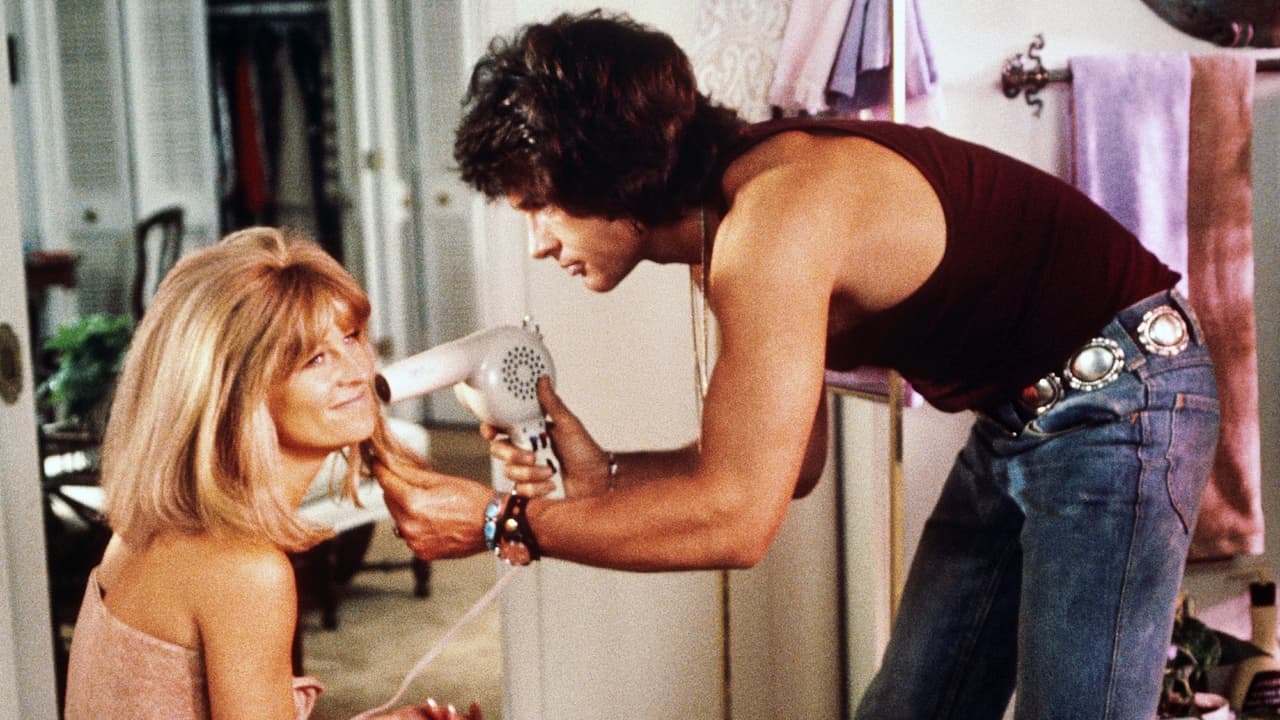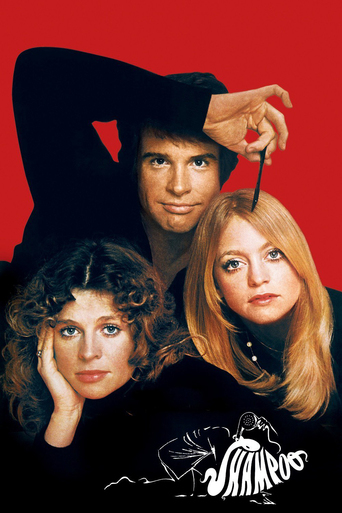

Plot--A pretty boy hairdresser in the ritzy precincts of Hollywood collects a string of paramours like a magnet. But he can't commit to anything outside his job, thereby causing a series of romantic complications.The movie got a lot of press at the time. That's not surprising since oral sex under the table and pornographic verbiage were not common movie currency. Take away the cutting edge novelty, however, and we're not left with much. That George (Beatty) is irresistible to women gets tiresome after about the thirtieth round. Were the lead some other actor, I'd figure the hairdresser stud reflected a big ego-trip. But Beatty needs reinforcement about as much as the Khardashians need more TV exposure.In my book, Warden steals the film as a shady financial manipulator, while Hawn's cuteness holds its own against Christie's sheer good looks. But I'm really glad to see Lee Grant get a challenging role as Warden's tormented wife. Grant was one of the real talents lost for years due to the crippling blacklist of the early fifties. And mustn't overlook Beatty who appears to slide easily into the Why-can't-I-be-more-than-just-a-pretty-boy role. Good thing Ashby directs with a glossy touch making the one-note plot easier to swallow. Anyway, forty years after its release, I view the narrative as a Beverly Hills version of La Dolce Vita (1960), the classic Italian take on the emptiness of the high life. Of course, that film had textures and depths entirely missing from this venture. Nonetheless, there's enough sexy female flesh to keep guys interested. But don't look for a showing at the National Organization of Women (NOW) anytime soon.
... View MoreBesides making it with every broad this side of his sister, Shirley, Warren Beatty finds himself as the lothario of the 1970's even with that wretched hairstyle of his own. The opening has him involved in an affair with Lee Grant, the Mrs. Robinson of the 1970's, who doesn't seem to mind that her powerful Republican husband Jack Warden has a young mistress of his own, the sweet Julie Christie. When Beatty, already involved in an uncommitted affair with Goldie Hawn (who is really just a female friend with benefits), also receives a pass from Grant and Warden's underage daughter, Carrie Fisher. So this is a comedy about sex, but Beatty might change his playboy ways if Christie has her way. Young fisher proves herself to be quite in charge when she confronts Beatty about his sexuality. Set around the election of Richard Nixon 6 years before, this has an outrageous election night party where Christie shocks Warden and angers Grant with a hysterically funny pass towards Beatty, followed by the oh so dignified speech of oblivious society matron Doris Packer. This can't help but be an unapologetic product of its times, even if there were major cultural differences between 1968 and 1975. Hawn and Christie are window dressing, yet very good, and Beatty is often a selfish prick. For as unlikable as their self- centered older characters are, it is Grant and Warden who stand out, with Grant stealing every scene she's in. The script is amusing and very adult, and makes me glad that in 41 years, sexual morals have provided at least a little decency that this makes fun of.
... View More"Shampoo" has famed Hollywood ladies' man Warren Beatty playing a role he was apparently born to do: a libidinous male hairdresser who chose his profession solely to be around women.He tries to navigate various relationships on the eve of the election in '68 that saw Nixon become president of the United States.I guess this is supposed to provide a sharp contrast; a man-whore trying to get laid with various women while the country goes to hell. It doesn't work: there isn't enough of the political stuff for it to be anything more than a distraction from the hairdresser's tawdry affairs.It's also an attempt at a comedy, eg. one of the conquests is a wife of a well heeled republican who assumes his wife's hairdresser is gay. This should be funny, but strangely isn't.Goldie Hawn is a true star but isn't given enough to do. You see too much of her, really, to take her seriously as a wide-eyed innocent, who, like the republican, also believes Beatty isn't a cooze hound.The final revelation should be poignant but again, isn't. This movie misses all its marks, and is really only kept afloat by its stars.
... View MoreIt is a 1975 film directed by Hal Ashy (BEING THERE 1979, 8/10), stars Warren Beatty, Goldie Hawn, and his then-lover Julie Christie, with an Oscar winning performance by Lee Grant and an Oscar-nominated turn by the perpetual character actor Jack Warden, sounds appealing to any cinephile, right? Yet SHAMPOO, not unlike its characters' utterly outmoded hairstyle, is a mediocre downer, which makes Grant's Oscar triumph looks like a fishy consolation prize for the sake of her career achievements. It is 1968, in the eve of the President Election, George (Beatty), a Beverly Hill hairstylist (by the way, no one dares to advise him to get his own flurry hairdo a neat trim), an inveterate womanizer and sex-addict, gyrates around his girlfriend Jill (Hawn) and the cougar patron Felicia (Grant), with other casual dalliances not included. Dreaming of open his own salon but rejected for a bank loan, George is introduced by Felicia to her wealthy hubby Lester (Warden), who might be interested in the investment, meanwhile, he encounters Jacky, his old flame, and discovers she is Lester's mistress. Inevitably Jacky and George rekindles their romance, and everyone involved needs an egress out of the sticky situation. Eventually, the obvious loser is George himself, but as we can envision, 30 minutes after the ending, he is back in his habitual mode to seduce another predator in the jungle of voluptuous creatures, it is hard to deny a self-revealing aspect of George's character is based on Beatty himself (oo who is the co-writer here).More like a personal project for Beatty and Christie, they are not at all in their top form, it it their pillow talk which leaves audience in a state of dumbness and aloofness. Goldie Hawn actually pulls off a renascent awareness of her own worth through maturing from a wide-eyed ingénue to a woman knows what she wants and feels pity on George's addiction. Lee Grant is ferociously acrid as the lust-driven middle-aged wife encircled with desperate loneliness, an Oscar-win is too much for the role nevertheless; Jack Warden is the token of a winner in a male-chauvinistic world, which proffers a rare showcase for this perpetually sidelined character thespian, in the end, he even dissipates some of the antipathy, which presumably aims towards Lester's shallowness and the stink of money, with an inherent affinity borders on visceral humility and drool naiveté, his adventure in a hippie party draws the best eye-sensational revelry in the entire film. But after all, SHAMPOO doesn't live up to my expectation and the ghastly dreadful coiffure, hope no retro vogue will tread back into that era, ever.
... View More